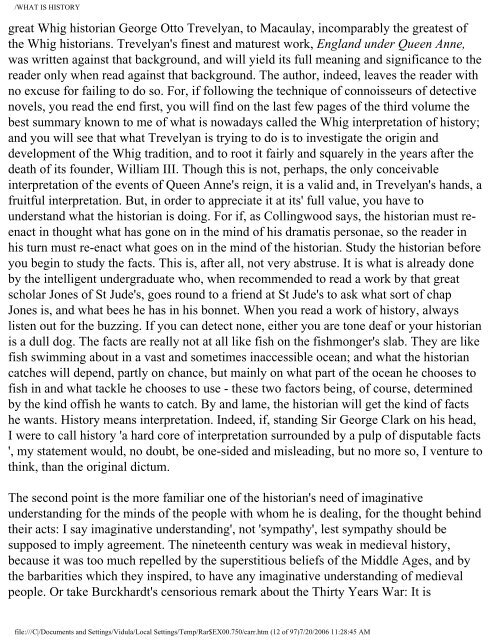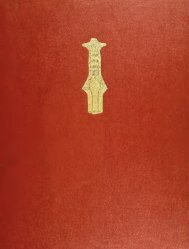What is History / by Edward Hallett Carr - Universal History Library
What is History / by Edward Hallett Carr - Universal History Library
What is History / by Edward Hallett Carr - Universal History Library
Create successful ePaper yourself
Turn your PDF publications into a flip-book with our unique Google optimized e-Paper software.
WHAT IS HISTORY<br />
great Whig h<strong>is</strong>torian George Otto Trevelyan, to Macaulay, incomparably the greatest of<br />
the Whig h<strong>is</strong>torians. Trevelyan's finest and maturest work, England under Queen Anne,<br />
was written against that background, and will yield its full meaning and significance to the<br />
reader only when read against that background. The author, indeed, leaves the reader with<br />
no excuse for failing to do so. For, if following the technique of conno<strong>is</strong>seurs of detective<br />
novels, you read the end first, you will find on the last few pages of the third volume the<br />
best summary known to me of what <strong>is</strong> nowadays called the Whig interpretation of h<strong>is</strong>tory;<br />
and you will see that what Trevelyan <strong>is</strong> trying to do <strong>is</strong> to investigate the origin and<br />
development of the Whig tradition, and to root it fairly and squarely in the years after the<br />
death of its founder, William III. Though th<strong>is</strong> <strong>is</strong> not, perhaps, the only conceivable<br />
interpretation of the events of Queen Anne's reign, it <strong>is</strong> a valid and, in Trevelyan's hands, a<br />
fruitful interpretation. But, in order to appreciate it at its' full value, you have to<br />
understand what the h<strong>is</strong>torian <strong>is</strong> doing. For if, as Collingwood says, the h<strong>is</strong>torian must reenact<br />
in thought what has gone on in the mind of h<strong>is</strong> dramat<strong>is</strong> personae, so the reader in<br />
h<strong>is</strong> turn must re-enact what goes on in the mind of the h<strong>is</strong>torian. Study the h<strong>is</strong>torian before<br />
you begin to study the facts. Th<strong>is</strong> <strong>is</strong>, after all, not very abstruse. It <strong>is</strong> what <strong>is</strong> already done<br />
<strong>by</strong> the intelligent undergraduate who, when recommended to read a work <strong>by</strong> that great<br />
scholar Jones of St Jude's, goes round to a friend at St Jude's to ask what sort of chap<br />
Jones <strong>is</strong>, and what bees he has in h<strong>is</strong> bonnet. When you read a work of h<strong>is</strong>tory, always<br />
l<strong>is</strong>ten out for the buzzing. If you can detect none, either you are tone deaf or your h<strong>is</strong>torian<br />
<strong>is</strong> a dull dog. The facts are really not at all like f<strong>is</strong>h on the f<strong>is</strong>hmonger's slab. They are like<br />
f<strong>is</strong>h swimming about in a vast and sometimes inaccessible ocean; and what the h<strong>is</strong>torian<br />
catches will depend, partly on chance, but mainly on what part of the ocean he chooses to<br />
f<strong>is</strong>h in and what tackle he chooses to use - these two factors being, of course, determined<br />
<strong>by</strong> the kind off<strong>is</strong>h he wants to catch. By and lame, the h<strong>is</strong>torian will get the kind of facts<br />
he wants. H<strong>is</strong>tory means interpretation. Indeed, if, standing Sir George Clark on h<strong>is</strong> head,<br />
I were to call h<strong>is</strong>tory 'a hard core of interpretation surrounded <strong>by</strong> a pulp of d<strong>is</strong>putable facts<br />
', my statement would, no doubt, be one-sided and m<strong>is</strong>leading, but no more so, I venture to<br />
think, than the original dictum.<br />
The second point <strong>is</strong> the more familiar one of the h<strong>is</strong>torian's need of imaginative<br />
understanding for the minds of the people with whom he <strong>is</strong> dealing, for the thought behind<br />
their acts: I say imaginative understanding', not 'sympathy', lest sympathy should be<br />
supposed to imply agreement. The nineteenth century was weak in medieval h<strong>is</strong>tory,<br />
because it was too much repelled <strong>by</strong> the superstitious beliefs of the Middle Ages, and <strong>by</strong><br />
the barbarities which they inspired, to have any imaginative understanding of medieval<br />
people. Or take Burckhardt's censorious remark about the Thirty Years War: It <strong>is</strong><br />
file:///C|/Documents and Settings/Vidula/Local Settings/Temp/Rar$EX00.750/carr.htm (12 of 97)7/20/2006 11:28:45 AM







